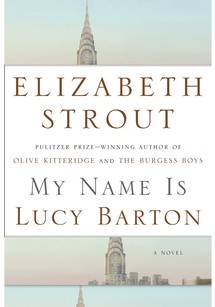In her spare and mesmerizing novel My Name Is Lucy Barton, Elizabeth Strout elegantly probes the chasm between what is said and what is felt as a daughter and her undemonstrative mother shyly reconnect. Lucy lies in a New York City hospital suffering from an undiagnosed illness when her mother unexpectedly arrives from rural Illinois, where Lucy grew up. This is no small thing; it's the mother's first time on a plane, and the women haven't seen each other for the better part of a decade. The visit makes Lucy "feel warm and liquid-filled, as though all my tension had been a solid thing and now was not," yet she wouldn't think of expressing this to someone embarrassed by the slightest show of emotion. The narrative weaves between five days and nights in the present—mother at daughter's bedside, often gossiping about acquaintances from back home—and Lucy's past. We glimpse the humiliating poverty of her childhood—a father who struggled to hold a job, the family living in a relative's unheated garage. We feel the ache that follows her as a young adult: "Lonely was the first flavor I had tasted in my life, and it was always there, hidden inside the crevices of my mouth..."
But while this is Lucy's story, it is also "a story about a mother who loves her daughter. Imperfectly. Because we
all love imperfectly." She used to strike her children "impulsively and vigorously" and punished her preschool-age daughter by locking her in a truck. "Imperfect" is an understatement. But in Strout's hands (remember
Olive Kitteridge?), understatement can devastate. In
Lucy Barton, a kiss not given—like an "I love you" never spoken or a glance turned toward the window—illuminates a lifetime of affection withheld. Yet, for all her outward coldness, the mother is too subtly drawn, too vulnerable to be condemned. We share Lucy's compassion when she thinks of how frightening it must have been for her mother to set foot in New York for the first time. And when her mother, in a rare moment of candor, apologizes for her failings, we empathize with Lucy's reflex to downplay them. Ultimately, for Lucy, it's not about eradicating childhood pain, but learning to accept it as part of us. "We hold it tight, we do, with each seizure of the beating heart:
This is mine, this is mine, this is mine."


